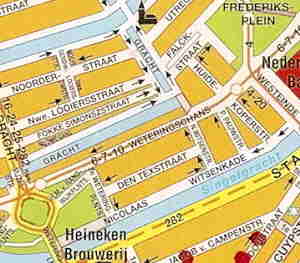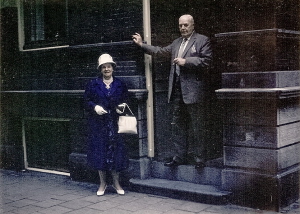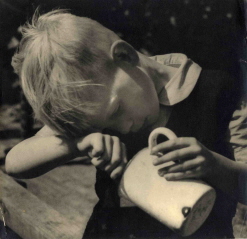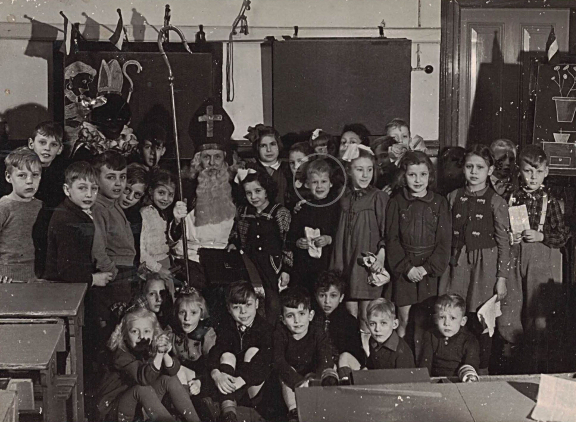
Some Memories of War
I was born in Amsterdam on the 22nd of September 1939 and was nearly eight months old when on May 10th, 1940 the Second World War caught up with The Netherlands. Of the early war years I remember little, of course, and most of my memories must be from 1943-1945, years when I slowly became old enough to be outside alone in the neighborhood, mostly around our house on the Pieter Pauwstraat and in the adjoining Weteringschans and Nicolaas Witsenkade, in the center of Amsterdam. I want to share these memories because people so often ignore what war does to children, and don’t consider their feelings or impressions because ‘they are only children’ and what do children know?
One of my earliest memories of that time was being out in
the street, playing. I must have been about four years old. With a
child’s concentration on whatever game I was involved in, I did
not notice that things became more and more quiet, not just in our
normally quiet street, but also on the usually busy
Weteringschans: the hour of the curfew had arrived while my father
had not yet returned home. Suddenly two German soldiers appeared
at either end of our street, shouting something to each other at
the top of their voices and scaring the pants off me. Crying, I
dove into the nearest doorway where a neighbor lady scooped me up.
This is perhaps why even now I detest loud, authoritarian people.

That the occupier transported Jews to concentration camps is well known, even if some now attempt to deny history. What is less well known is that they also forced non-Jewish men to work in their industries in Germany. One day my father asked me to mail a letter in the Den Texstraat, not far from where we lived. To get there I had to walk a short way along the Weteringschans, then turn left on the Nicilaas Witsenstraat and right again into the Den Texstraat. As I walked along the Weteringschans, a column of men in civilian clothes came marching the opposite way, either work-draftees or Jews, heading for transport east. Just as I was about to cross the Nicolaas Witsenstraat into Den Texstraat, a young man ran by me at full speed and headed into the Den Texstraat. Close behind came a German soldier who, concluding the man had run too far to catch up with, stopped right near me, aimed his rifle and shot. I dropped the letter in the mailbox and returned home.
The winter of 1944-45 was a terrible one. It was very cold
and food was becoming more and more scarce, especially in the
cities. City folk, including my father, often headed into the
countryside, hoping to obtain some cabbages or potatoes from
farmers, usually at exorbitant prices. Before the war my father,
Peter Wessing, had been a ships-mate on a freighter, but the war
ended all that, of course. To make a living he turned his hobby of
photography into a business and set out to take photographs of
people’s newborn babies and other family occasions. He also
illustrated advertisements and articles in women’s magazines,
using my mother, my brother and myself as photo models. One
afternoon I was playing in front of our house, when a passing lady
looked at me and asked if I was that little boy in the magazine
pictures. I didn’t know, but she rang our bell and asked my
father’s then girlfriend about it – he’d broken up with my mother.
That is how I met Mrs. Tine van Blaaderen and her husband Dik, who
lived a short distance away around the corner on the Nicolaas
Witsenkade. She took me home and soon Tante (Aunt) Tine and Oom
(Uncle) Dik were an inseparable part of my young life. As Oom Dik
had a senior position at a bank, they were relatively well off
even in those times and so they fed me almost daily during that
terrible winter. I came through the war relatively well, thanks
among others to Tante Tine and Oom Dik who took me into their
lives. I don’t have a photograph of them from those days. This one
was taken in 1961, when I returned to Holland on a vacation after
a 13-year absence:

Many were not lucky enough to have someone feed them. I
remember a man lying dead on the sidewalk of our street. He’d
probably collapsed with hunger and then just died of the cold
during the night. Coal for heating was scarce and supplies were
diminishing, and everything that could burn, including wooden
toys, was put into the stove. To gather more fuel I was given a
bag made from the leg of a worn out pair of my father’s trousers,
to gather wood in parks. One day, coming home from a park I had to
cross some tram rails. At the time wooden blocks separated these
rails and there was a small crowd of people with crowbars prying
loose the blocks for fuel. Seeing an opportunity I joined right in
and filled my bag until some German soldiers on horseback made a
big to-do about it. I don’t know what happened after that because
I dashed home with my loot, but we did have a fire that night.
While many passively suffered through the war years, some few
resisted in what way they could. Books and films tend to focus on
'underground' actions with machine guns and such, but much was
also done more quietly: providing those on the run from the
Germans with false papers or hiding them somewhere in their
homes.My father, being a photographer, was sometimes called on to
provide photographs for false I.D. cards. One day our house was
raided, but, while a batch of I.D. pictures was lying there for
all to see, they were somehow not noticed. Listening to the radio,
especially the BBC, was strictly forbidden. Many nevertheless had
a radio hidden somewhere in the house. One day I noticed my father
doing something strange with a wire and a funny looking box that
suddenly began to make noise. Being 4 or 5 years old at the time I
had no notion of the danger and proudly proclaimed that 'my father
strings a wire along the wall and the box begins to talk'. Luckily
this did not reach the wrong ears, and I was soon told to keep
quiet about such things.
A few days later the liberating Canadian troops finally
entered the city and the war was really over. The Canadians were
the heroes of the day, of course, and asked what I wanted to be
when I grew up I answered ‘a Canadian!’ Airplanes dropped bread
from the sky and there was food for a hungry city. Here is a
picture my father took of me right about then:

And so the war was
over. Compared to millions of others, then and since, my
experiences of war are small potatoes, but I will be thankful if
these memories cause someone to think. For me a new chapter of my
life began: I was nearly six and it was time to head for the Elizabeth
Wolff school on the Prinsengracht in Amsterdam.
